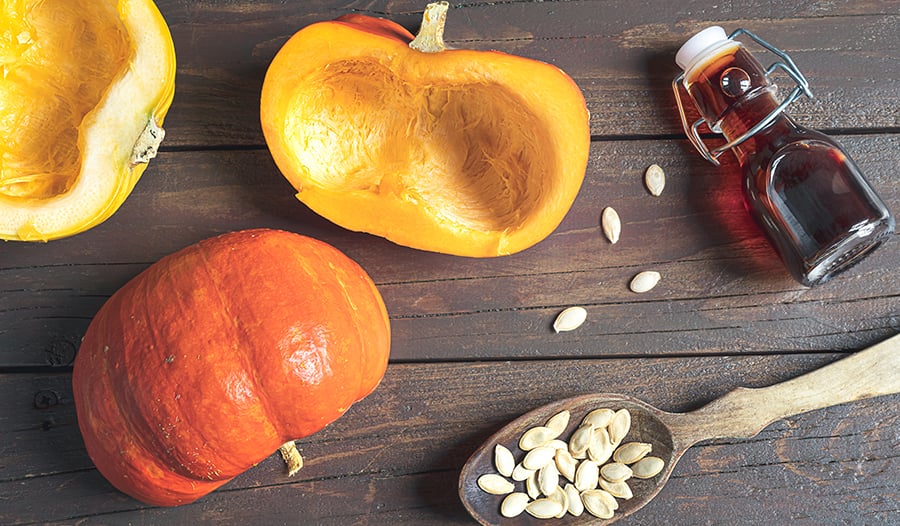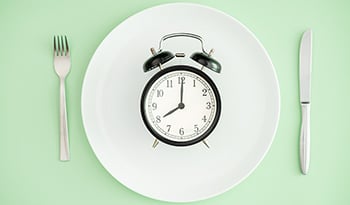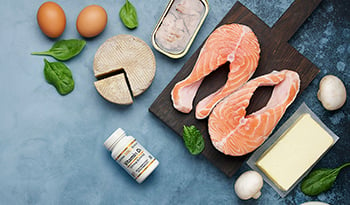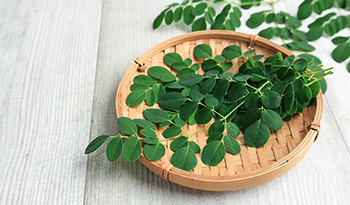Pumpkin Seed Oil: Top 5 Benefits From Hair Loss to Prostate Health

Native to North America, including the southern United States and northeastern Mexico, pumpkin is a vernacular term for mature winter squash. With historical use dating back to 7000 BC, pumpkin is one of the oldest domesticated plants used for food and festivity.
The plant’s pulp is used for pies commonly eaten in the United States and Canada, particularly around Thanksgiving. The hard outer shell is traditionally used to carve jack-o-lanterns for Halloween and fall festivals. The seeds are roasted and eaten and are sold in many North American markets as salted snacks, similar to peanuts or sunflower seeds.
Pumpkin seeds can also be pressed to express the oil which is used in cooking as well as in dietary supplements. Here, we will explore pumpkin seed oil's many potential health benefits and how it could boost your wellness and vitality.
Top 5 Potential Health Benefits of Pumpkin Seed Oil
Pumpkin seed oil may have health benefits for both men and women alike. Let us explore the top five potential health benefits of pumpkin seed oil.
1. Pumpkin Seed Oil May Help Hair Loss
Many studies have found taking pumpkin seed oil both orally and topically can improve hair growth in men, women, and animals.
One study found that, after three weeks, mice with topical application of pumpkin seed oil saw an increase in hair growth.
Not only did studies show topical pumpkin seed oil helped with animal hair growth, but they have also shown that it can help with female hair loss. One study found that topical application in women with hair loss showed increased hair growth after three months of using pumpkin seed oil.
Yet another study looked at men with hair loss. Some men were given a placebo, and some were given 400 mg of pumpkin seed oil to take orally. After 24 weeks, the study found that the men taking the pumpkin seed oil had four times the hair growth of their placebo counterparts. The study also reported better scores in hair loss improvement for the pumpkin seed oil participants.
2. Pumpkin Seed Oil May Benefit Urinary Tract Health
Overactive bladder can be a difficult condition to live with. Frequent trips to the restroom can be taxing and can have lasting negative effects on one’s lifestyle. Pumpkin seed oil could be a solution to the daunting problem.
One study found that a daily dose of 10 g of pumpkin seed oil given for 12 weeks reduced overactive bladder symptoms. The researchers evaluated urinary function using Overactive Bladder Symptom Score (OABSS). They found that pumpkin seed oil from C. maxima significantly reduced the degree of OABSS in the study participants. The researchers concluded the results from the study suggest that pumpkin seed oil extracts from C. maxima and from C. pepo are effective for urinary disorders such as overactive bladder in humans.
3. Pumpkin Seed Oil May Help Enlarged Prostate
Also related to urinary health in men, an enlarged prostate can cause difficulty with urination by blocking the flow of urine through the urethra. The prostate is a walnut-shaped gland that produces semen and surrounds the urethra at a certain point along the male urinary tract. Benign prostatic hyperplasia, or BPH, is a common condition of an enlarged prostate, found more often in men as they age. Pumpkin seed oil supplements have been shown to have some benefits for men with BPH.
One study found that men with BPH who took 320 mg of pumpkin seed oil once a day for 12 months had improved quality of life, increased urinary flow, and reduced symptoms.
Another theory is that testosterone levels affect prostate growth. A metabolite of testosterone called dihydrotestosterone is thought to accumulate in the prostate gland, causing it to grow larger. The nutrients in pumpkin seeds may prevent the conversion of testosterone to dihydrotestosterone and may reduce dihydrotestosterone's effects on prostate gland growth.
Zinc is an important element needed for proper prostate function. The prostate gland is the part of the body that has the highest concentration of zinc. A study found men with BPH had lower than normal prostate zinc levels and were excreting higher than normal amounts of zinc in the urine.
Pumpkin seeds are high in zinc. One cup of pumpkin seeds will deliver approximately half the recommended daily allowance (RDA) of zinc. Eating pumpkin seeds as a snack several times a week could benefit prostate health.
If you struggle with managing the symptoms of an enlarged prostate gland, pumpkin seed oil could be an ideal addition to your healthcare routine.
4. Pumpkin Seed Oil May Improve Heart Health
While larger and more rigorous studies are needed, several smaller studies have found that pumpkin seed oil may have significant heart health benefits.
A study involving mice found that pumpkin seed oil may help improve cholesterol and triglyceride levels while also reducing blood pressure.
A different study gave postmenopausal women three grams of pumpkin seed oil daily. The researchers found significant improvement in blood vessel function and stiffness. These findings could lower the risk of hypertension or high blood pressure.
Another study with postmenopausal women participants found that pumpkin seed oil supplementation increased HDL or good cholesterol levels.
If you suffer from high blood pressure, hardening of the arteries, high cholesterol, or are postmenopausal, taking a pumpkin seed oil supplement could be right for you.
5. Pumpkin Seed Oil Is a Nutrient-Dense Food
Packed with nutrients, pumpkin seed oil can add many beneficial phytonutrients to your diet.
While all oils are fats, pumpkin seed oil is made of healthy fats, including polyunsaturated and monounsaturated fatty acids. These fatty acids are known to benefit heart health. The high concentration of linoleic acid may be good for heart health as well as helping with blood sugar regulation. One tablespoon of pumpkin seed oil contains 14 grams of fat and 120 calories.
In addition to zinc, pumpkin seed oil is a good source of potassium, calcium, magnesium, iron, and phosphorus. Each of these minerals plays a vital role in your health and well-being.
Also full of disease-fighting antioxidants, pumpkin seed oil can help reduce your risk of chronic illness and untimely aging. Rich in carotenoids and polyphenols, these powerful antioxidants help to decrease chronic inflammation in the body.
How to Take Pumpkin Seed Oil
There are a variety of ways to consume pumpkin seed oil. You can eat pumpkin seeds, raw or roasted. Pumpkin seed oil can also be used in foods, ideally after cooking. With a low smoke point, lower than most other cooking oils, it is best to add pumpkin seed oil as a topper after cooking to enjoy the savory, nutty flavor healthily. Drizzling the oil over a salad is one practical way you can use the oil with food. Avoid frying or sauteing with pumpkin seed oil.
Pumpkin seed supplements are also a great way to ingest good amounts of the oil. Supplements often come in capsule form but can also be found in liquid form. The liquid form can be taken orally and used topically on the skin and scalp.
There is no recommended daily allowance for pumpkin seed oil. It is best to follow the dosing instructions on the supplement packaging.
Risks of Pumpkin Seed Oil
Pumpkin seed oil is considered generally safe with very few potential side effects.
Allergic reaction is possible for those allergic to pumpkin or pumpkin seeds. If an allergy is present, it can be triggered by either oral ingestion or topical application.
Due to its high fat content, the amount taken should be in moderation to avoid potential unwanted weight gain. One cup of pumpkin seeds yields 285 calories.
High in fiber, pumpkin seeds can cause gas and bloating or constipation if too many are eaten at once. While eating a high-fiber diet can help decrease constipation, eating a lot of fiber at one time can cause constipation.
Be sure to talk to your doctor before adding pumpkin seed oil to your supplement regimen.
The Big Picture
Pumpkin has been used as a domestic plant for food for millennia. Pumpkin seed oil has many health benefits that could boost your overall health and wellness.
From heart health benefits to urinary bladder support, pumpkin seed oil may reduce blood pressure and symptoms of overactive bladder.
BPH is a common condition in men. Pumpkin seed oil may help reduce and prevent prostate enlargement while helping to alleviate symptoms of BPH.
Hair loss is common among both men and women. Studies show taking pumpkin seed oil orally or topically can help decrease hair loss and increase hair growth.
Packed with vital nutrients and healthy unsaturated fats, pumpkin seed oil could be a part of a healthy lifestyle. Rich in antioxidants, pumpkin seed oil can help decrease chronic inflammation and your risk of chronic illness.
References:
- Cho YH, Lee SY, Jeong DW, et al. Effect of pumpkin seed oil on hair growth in men with androgenetic alopecia: a randomized, double-blind, placebo-controlled trial. Evid Based Complement Alternat Med. 2014;2014:549721. doi:10.1155/2014/549721
- Christudoss P, Selvakumar R, Fleming JJ, Gopalakrishnan G. Zinc status of patients with benign prostatic hyperplasia and prostate carcinoma. Indian J Urol. 2011;27(1):14-18. doi:10.4103/0970-1591.78405
- El-Mosallamy AE, Sleem AA, Abdel-Salam OM, Shaffie N, Kenawy SA. Antihypertensive and cardioprotective effects of pumpkin seed oil. J Med Food. 2012;15(2):180-189. doi:10.1089/jmf.2010.0299
- Gossell-Williams M, Hyde C, Hunter T, et al. Improvement in HDL cholesterol in postmenopausal women supplemented with pumpkin seed oil: pilot study. Climacteric. 2011;14(5):558-564. doi:10.3109/13697137.2011.563882
- Gossell-Williams M, Lyttle K, Clarke T, Gardner M, Simon O. Supplementation with pumpkin seed oil improves plasma lipid profile and cardiovascular outcomes of female non-ovariectomized and ovariectomized Sprague-Dawley rats. Phytother Res. 2008;22(7):873-877. doi:10.1002/ptr.2381
- Hajhashemi V, Rajabi P, Mardani M. Beneficial effects of pumpkin seed oil as a topical hair growth promoting agent in a mice model. Avicenna J Phytomed. 2019;9(6):499-504. doi:10.22038/AJP.2019.13463
- Hong H, Kim CS, Maeng S. Effects of pumpkin seed oil and saw palmetto oil in Korean men with symptomatic benign prostatic hyperplasia. Nutr Res Pract. 2009;3(4):323-327. doi:10.4162/nrp.2009.3.4.323
- Ibrahim IM, Hasan MS, Elsabaa KI, Elsaie ML. Pumpkin seed oil vs. minoxidil 5% topical foam for the treatment of female pattern hair loss: A randomized comparative trial. J Cosmet Dermatol. 2021;20(9):2867-2873. doi:10.1111/jocd.13976
- Montesano D, Blasi F, Simonetti MS, Santini A, Cossignani L. Chemical and Nutritional Characterization of Seed Oil from Cucurbita maxima L. (var. Berrettina) Pumpkin. Foods. 2018;7(3):30. Published 2018 Mar 1. doi:10.3390/foods7030030
- Nishimura M, Ohkawara T, Sato H, Takeda H, Nishihira J. Pumpkin Seed Oil Extracted From Cucurbita maxima Improves Urinary Disorder in Human Overactive Bladder. J Tradit Complement Med. 2014;4(1):72-74. doi:10.4103/2225-4110.124355
- Siano F, Straccia MC, Paolucci M, Fasulo G, Boscaino F, Volpe MG. Physico-chemical properties and fatty acid composition of pomegranate, cherry and pumpkin seed oils. J Sci Food Agric. 2016;96(5):1730-1735. doi:10.1002/jsfa.7279
- Wong A, Viola D, Bergen D, Caulfield E, Mehrabani J, Figueroa A. The effects of pumpkin seed oil supplementation on arterial hemodynamics, stiffness and cardiac autonomic function in postmenopausal women. Complement Ther Clin Pract. 2019;37:23-26. doi:10.1016/j.ctcp.2019.08.003
DISCLAIMER:This Wellness Hub does not intend to provide diagnosis...
















































































 Table of Contents
Table of Contents
















